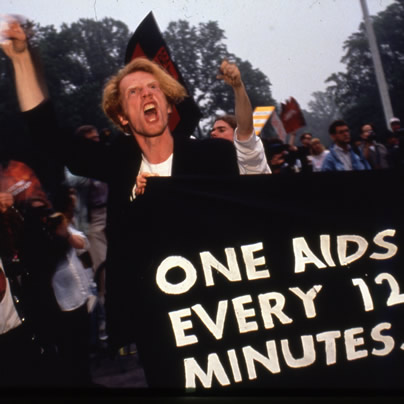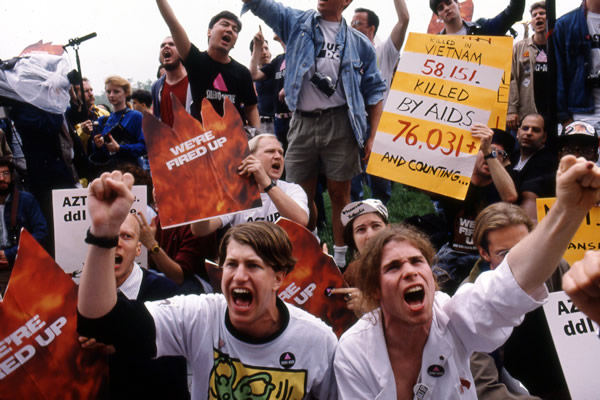Living
Surviving Oscar
Gay writer scores Academy nomination for debut film about AIDS


A scene from David France’s harrowing documentary ‘How to Survive a Plague.’ The film has its Oscar rendezvous Sunday night at the Dolby Theatre in Hollywood where its up for Best Documentary. (Photo courtesy Sundance Selects)
It sounds so straightforward — the New York Public Library had a collection of videotapes AIDS activists made decades ago with vintage camcorders back when they were heavy behemoths you had to rest on your shoulder with full-size VHS or Beta tapes inside. Filmmaker/journalist David France combed painstakingly through the clips to compose his powerful 2012 documentary “How to Survive a Plague.”
But how this was achieved — what format was the footage stored in? What condition was it in? Could anyone go in and check these out with a library card? How did France pull this off?
In some ways, it’s the least interesting part of the film’s story, which is told via a sobering chronology of video footage shot by angry protesters — the kind the Religious Right calls “militant homosexual activists.”
The film has been almost universally praised. The New York Times called it “inspiring” and crackling with “currents of rage, fear, fiery determination and finally triumph.” It has a 100 percent freshness rating among critics on Rotten Tomatoes (a film quality-ranking site), several awards including “best documentary” from the Boston Society of Film Critics. This weekend it’s up for both an Independent Spirit Award and an Oscar. Gold Derby, a site that predicts entertainment industry awards, gives it a 4/1 chance at winning the Oscar (behind “Searching for Sugar Man” which it gives 13/8 odds). “5 Broken Cameras,” “The Gatekeepers” and “The Invisible War” (made by the “Outrage” team of Kirby Dick and Amy Ziering) are also nominated.
For “Plauge,” France took footage — some of which was housed at the New York Public Library — shot by 31 videographers and paces it chronologically to the story of the formation of ACT UP (AIDS Coalition to Unleash Power), a group that formed in March 1987 in a spirit of extreme frustration during a speech activist (and “Normal Heart” playwright) Larry Kramer gave at the Lesbian and Gay Community Services Center in New York.
France, during a lengthy phone interview last weekend before he was scheduled to fly to Los Angeles on Tuesday, gladly shares the logistics behind “Plague’s” formation.
A veteran investigative journalist, author and GLAAD Media Award winner (for a GQ piece on gays in Iraq) who’s had his work published in everything from the New Yorker to Ladies’ Home Journal, France says he was a graduate student during the time AIDS hit in the early 1980s and having written about it extensively over the years, he knew activists had brought cameras to their protests. And yes, the process of crafting “Plague” was a lot more involved than simply checking tapes out of the library.
“The tapes from the library are actually just a small portion of the footage you see in the film,” France, who’s gay, says. “That’s really the first door I went through, this archive of AIDS activism video that’s housed in the Manuscript Division of the New York Library, where you go if you want to read Lincoln’s letters. It’s an exclusive corner of the library that’s not accessible to the general public and everybody’s going around wearing white gloves and handling antiquities. In one corner, they have a television and a VCR and you watch the AIDS footage recorded in those early days. It’s just raw footage, not really ever intended for public view. Some of it you’ll be watching and all of a sudden it will go to a gay porn video, which just happened to be on the same tape they recorded on.”
France says the library kept all the tapes — recorded in every home video format on the market in those years as one might imagine — but had transferred them all to the Betacam SP format, a higher resolution tape on larger cassettes that for years was the broadcast standard and is still in use today. France convinced the library to let him take select footage to a nearby production lab and have it digitized. He ended up with about 100 hours and says the process became difficult as the project moved along.
“They’re really not accustomed to working on a film production schedule, so trying to get them to hurry got more and more difficult as we went along,” he says.
And that was just the starting point — in the library footage, France saw other people holding video cameras. He started tracking them down one by one and eventually found a group of people, many long-time AIDS survivors themselves, who had videotape footage they had never revisited. Again, formats remained a challenge.
“We had all this stuff in so many different formats from private collections,” he says. “We were constantly scouring Craigslist and eBay for decks that would play these old tapes. We ended up with about 800 hours and that really became the building blocks of the film.”
And yes, France says it did take some persuasion to get these individuals to hand over their footage.
France says, “A lot of these people had moved on but I think now have started to see the real value in this footage. I think they gradually started to realize, that yes, enough time has passed and now is the time to really use it and this is the project.”
France said his project is timely and important because many of the other landmark AIDS pieces, from Kramer’s play to Randy Shilts’ “And the Band Played On” were written before the era of anti-retroviral therapy when HIV morphed into a more manageable condition.
He says the film is important for anyone interested in the AIDS fight to see.
“There were even people in ACT UP who didn’t know the outcomes of many of these things,” he says. “If you think you know the story of AIDS, this film will surprise you and that goes for just about everybody.”
http://www.youtube.com/watch?v=wwhFS1mUaVY
WASHINGTON BLADE: Will this be your first time at the Academy Awards?
DAVID FRANCE: Yes. I’ve never gotten any closer before than my television screen.
BLADE: Have you watched very often over the years?
FRANCE: Oh yeah. My boyfriend and I always have an Oscar party. With ballots and everything. I’ve never won.
BLADE: What’s your favorite Oscar memory?
FRANCE: Tom Hanks’ acceptance speech when he won for “Philadelphia.” That’s really seared in my memory.
BLADE: What did you think of Michael Moore’s controversial speech when he won the category you’re up for? Ballsy or inappropriate for the occasion?
FRANCE: I think if you’ve got an audience of a billion people and you’ve got something to say, you need to say it. That’s not to say I’m intending any surprises should I have that opportunity.
BLADE: Have you seen the competition?
FRANCE: Of course. They’re all brilliant films.
BLADE: If you win, where will you put Oscar?
FRANCE? I’m not sure. I keep the other awards we’ve won in the production office so everyone on the crew can enjoy them and hopefully see their own contribution but if we get this little gold thing, I’m not sure. I have no idea.
BLADE: Do you feel AIDS, as horrible as it was and is, put gay issues on the national radar and that ended up being a silver lining to the cloud or is that an absurd oversimplification?
FRANCE? No, it’s absolutely true. Before that, gay people were entirely disenfranchised and we were not seen as being contributing members to the culture at all. We had no role whatsoever in civic life … From those ashes (of AIDS), now we have a president who acknowledges us as human beings and Stonewall is mentioned in the same breath as Seneca Falls.
BLADE: How did you feel when Dustin Lance Black won for “Milk”?
FRANCE: I felt it was incredible. He gave a great speech and I thought it was a very, very good movie.
BLADE: Did you plan all along to submit it for a nomination? What’s the process like?
FRANCE: There are all kinds of rules about it playing in New York and L.A. and being reviewed by the New York Times and the Los Angeles Times and that’s just the first threshold. I was lucky I had a distributor who saw the potential for the film early on and made sure we did everything we needed to do for both the Oscars and the Independent Spirit Awards. … Anytime you make a film, sure, you fantasize about getting an Oscar nomination and it’s really just because you want more people to see it. An Oscar bump is a tremendous thing.

Did you melt like the Wicked Witch of the West this week?
As summer temperatures rise, keeping your home or apartment cool during a heat wave can become both a comfort issue and a financial challenge. One of the most effective ways to keep a home cool is to prevent heat from entering in the first place. Sunlight streaming through windows can significantly raise indoor temperatures. Consider the following solutions:
• Close blinds or curtains during the hottest parts of the day. Blackout curtains or thermal drapes can reduce heat gain by up to 30%.
• Install reflective window films to block UV rays and reduce solar heat without sacrificing natural light.
• Use outdoor shading solutions such as awnings (yes, the ones you removed because they were “dated”) and shutters to limit direct sunlight.
Fans are a cost-effective way to circulate air and create a wind-chill effect that makes rooms feel cooler.
• Ceiling fans should rotate counterclockwise in the summer to push cool air down.
• Box fans or oscillating fans can be placed near windows to pull in cooler evening air or push hot air out.
• Create a cross-breeze by opening windows on opposite sides of your home and positioning fans to direct airflow through the space.
• For an extra cooling effect, place a bowl of ice or a frozen water bottle in front of a fan to circulate chilled air.
To optimize natural ventilation, open windows early in the morning or late in the evening when outdoor temperatures drop. This allows cooler air to flow in and helps ventilate heat that built up during the day.
Appliances and electronics generate a surprising amount of heat. To reduce indoor temperatures:
• Avoid using the oven or stove during the day; opt for no-cook meals, microwave cooking, or grilling outside.
• Run heat-producing appliances like dishwashers and clothes dryers in the early morning or late evening.
• Unplug electronics when not in use, as even standby power can add heat to your space.
• Switching to energy-efficient LED lightbulbs can also reduce ambient heat compared to incandescent lighting.
If you do use an air conditioner, maximize its effectiveness by:
• Setting it to a reasonable temperature—around 76–78°F when you’re home and higher when you’re away.
• Cleaning or replacing filters regularly to maintain airflow and efficiency.
• Sealing gaps around doors and windows to prevent cool air from escaping. (Didn’t we all have a parent who said, “Close the door. You’re letting all the cool out?”)
• Using a programmable thermostat to optimize cooling schedules and reduce energy use.
If it is not cost-prohibitive, adding insulation in attics and walls can greatly reduce heat transfer. Solar panels that reflect heat can also help, as well as offset the cost of their installation. Adding weatherstripping around doors and windows, sealing cracks, and using door sweeps can make a significant difference in keeping heat out and cool air in.
Natural and eco-conscious methods can also help cool your home.
• Snake plants, ferns, or rubber trees can improve air quality and slightly cool the air through transpiration.
• White or reflective roof paint can reduce roof temperatures significantly.
• Cooling mats or bedding can make sleeping more comfortable without cranking up the A/C.
For renters or those who can’t make permanent modifications, there are still plenty of ways to keep cool.
• Use portable fans and A/C units instead of built-in systems, making sure they are the correct size for your space.
• Removable window film or static cling tinting can reflect heat without violating your lease.
• Install tension rod curtains or temporary blackout panels instead of hardware-mounted window coverings.
• Add draft blockers and weatherstripping tape that can be applied and removed without damage.
• Cover floors with light-colored rugs to reflect heat rather than absorb it.
• If allowed, use temporary adhesive hooks to hang reflective materials or light-filtering fabrics over windows.
Even if your space is warm, you can still take steps to help your body stay cool.
• Wear light, breathable fabrics like cotton or linen.
• Stay hydrated and avoid caffeine or alcohol during peak heat hours.
• Take cool showers or use damp cloths on your neck and wrists to bring your body temperature down.
Keeping your home or apartment cool in the summer doesn’t have to be expensive or energy-intensive. With a few adjustments such as blocking sunlight, optimizing airflow, using fans effectively, and making renter-friendly upgrades, you can create a more comfortable indoor environment while keeping energy bills in check.
Valerie M. Blake is a licensed Associate Broker in D.C., Maryland, and Virginia with RLAH @properties. Call or text her at 202-246-8602, email her at DCHomeQuest.com, or follow her on Facebook at TheRealst8ofAffairs.
Real Estate
The world’s on fire and D.C. is on sale (sort of)
Prices are up, but then again, nothing makes sense anymore

ICE is disappearing people, revered government agencies are shuttering, and who knows if we’ll be in World War III next week? But can you believe prices in D.C. are actually still up 6.3% since last year? It doesn’t make sense, and perhaps that does make sense, because nothing seems to make any sense any more.
That said, there are some parts of our market that are truly suffering. The interest rates, which have been up, up, up for about four years now, are the ongoing rain on our market’s military parade. Combine that with 75,000 federal employees taking a buyout nationwide, and DOGE cuts eliminating around 40,000 federal jobs in the District (per estimates by the D.C. CFO), not to mention thousands of other job losses in non-governmental organizations due to funding and program cuts, and you’ve got a case of uncertainty, and downright unaffordability in the pool of otherwise would-be buyers.
This has had a marked impact on properties that starter-home buyers and low- to mid-level employees would otherwise buy, most notably condominium and cooperative apartment units. These properties have already slowed in our market thanks to the profound impact that higher interest rates have had on their monthly carrying costs—pair that with job insecurity, and a lot of condos are proving to be very difficult to sell indeed.
So how is the average sale price up in our market?
The increase is almost entirely due to the resounding strength of the single-family home market, especially in upper Northwest D.C., where it is still quite common to see bidding wars, even on properties pushing past the $3M mark. It seems that buyers in that echelon are less impacted by a few percentage points in the interest rate, and less concerned about their job security. Notably, those buyers are often married with children and have an absolute need for more space, must stay in the area due to one spouse’s job, or the kid’s friend group, regardless of whether the cost of owning is thousands of dollars more per month than it would have been in 2020 or 2021. The continued appreciation in these neighborhoods defies imagination.
So, what to do if you are not one of those lucky enough to be shopping for a $3M home? The short answer: wait. If you want more space, rent your current place out and learn the joys of being a landlord while someone else pays your mortgage. Need the equity from your current home to buy your next place? Get a home equity line of credit, or loan, and pull the equity out of your current place to buy the next one. Or—and I have never recommended this before in 21 years of being a Realtor—rent for a few years. Sure, I’d love to list and sell your condo so you can climb the real estate ladder, but it might just be a waste of time, money or both if you could just ride out this storm and sell in a DOGE-less future.
All this said, there are some condos that seem to be immune from this recent negative news. Anecdotally, it feels like it’s the truly special ones that do just fine no matter the market. Our recent listing in Capitol Hill had a view from every one of its 15 windows of the Supreme Court. Sold in five days with six offers. Another condo was on the top two floors of a townhouse and had the coolest black wood floors that gleamed like a grand piano. Sold in four days at full price.
So, all is not for naught if you have a condo or home in an area that people want to be in, with nice space, light, amenities and a certain je ne sais quois. And, as long as we have a democracy in a few years, my experience says our market will be back, stronger than ever, really soon.
David Bediz is a Realtor and mortgage loan broker for the Bediz Group LLC and Home Starts Here, LLC. Reach him at [email protected].

In this corner, there’s the Genesis QV70, newly updated and full of glitzy gizmos. And in the opposing corner, there’s the Lexus NX, a fan fave known for comfort and reliability.
Both are strong contenders. Both have proven to be equally adept at bobbing and weaving through traffic. And both can go toe to toe with pricier competitors.
And yet, what would happen when they sparred against each other? Here’s your ringside seat to find out.
GENESIS QV70

$50,000
MPG: 22 city/28 highway
0 to 60 mph: 5.9 seconds
Cargo space: 28.9 cu. ft.
PROS: Stylish. Good value. Lots of standard amenities.
CONS: So-so fuel economy. Quirky dash controls.
IN A NUTSHELL: When it comes to speed, the Genesis QV70 is faster on its feet than the Lexus NX. Neither of these crossover SUVs is a lightweight, but the QV70 offers more potent powerplants—including an all-electric version that zips from 0 to 60 mph in just 3.8 seconds. In other words, Porsche Macan S territory.
The two gas-powered options—a four-cylinder turbo and twin-turbo V6—also got my blood pumping. So did the velvetlike suspension mixed with deft handling and stop-on-a-dime braking. But this adrenaline rush comes at a cost: sacrificing fuel economy.
As for the automaker’s design philosophy—“athletic elegance”—it’s on full display here: an oversized grille inspired by the Genesis emblem, the dramatically arcing silhouette, and those distinct quad headlights and taillights. It’s not easy to stand out when 25% of all vehicles sold in the U.S. are compact crossovers, so kudos to the QV70 for being such a head-turner.
The mod-yet-minimalist styling carries over to the cabin, with its high-quality materials: real-wood accents, soft-touch plastics and a tasteful glass shift knob. New this year is a sweeping 27-inch dashboard monitor, which houses the gauge cluster and infotainment touchscreen. Alas, this display is positioned a bit far from the driver (though I must admit reaching for it did help stretch a few tight back muscles).
Instead of being a costly extra, this gigantic monitor comes standard. So do synthetic leathers seats, nine-speaker stereo, smartphone/wireless connectivity, hands-free liftgate, tons of safety gear and more. Options include a panoramic sunroof, three-zone climate control, 16-speaker Bang & Olufsen audio, synthetic suede headliner, sound-reducing rear windows, automated parking and other goodies.
What’s the score so far? Despite some minor quibbles, the Genesis QV70 is a worthy challenger that pulls no punches.
LEXUS NX

$43,000
MPG: 26 city/33 highway
0 to 60 mph: 8.2 seconds
Cargo space: 22.7 cu. ft.
PROS: Fuel efficient. Comfy seats. Rock-solid reliability.
CONS: Pokey base model. Limited rear storage.
IN A NUTSHELL: Sure, the Lexus NX isn’t as speedy as the Genesis QV70. But, as with the tortoise and the hare, sometimes slow and steady wins the race. And really, it’s only the entry-level NX that feels sluggish, such as when trying to quickly merge into freeway traffic.
Other trim levels, including two hybrid options, are just fine. And no matter the engine choice, the counterpunch here is that these vehicles get better gas mileage: 20% higher fuel economy than in either the four-cylinder or V6 in the Genesis. The two NX hybrids are even more green, with the high-end plug-in version able to travel up to 37 miles on electric power alone. One downside: There is no all-electric NX—well, at least not yet.
As with parent-company Toyota, Lexus offers stellar vehicle reliability—often ranked No. 1 in dependability and crash-test surveys year after year. Lexus vehicles generally hold their value better than Genesis, because this newer brand has a shorter history. Lexus also has a larger dealer network, though the number of Genesis dealerships is growing.
But when it comes to cargo space, the NX is about two inches shorter and narrower than the QV70, which has more stowage area. And Genesis handling is sportier, though the Lexus feels sure and well-grounded.
Luxe interior amenities are basically the same in both vehicles. But interior styling in the QV70 is trendy, while the NX is more understated. In other words, a choice between sassy and classy.
This is a very competitive vehicle segment, with Euro models like the Audi Q5, BMW X3 and Mercedes GLC also duking it out in what seems like a clash of the titans.
But as for the Genesis QX70 or Lexus NX, which is the winner? For me, both are real knockouts—so I’d call it a draw.
-

 U.S. Supreme Court3 days ago
U.S. Supreme Court3 days agoSupreme Court upholds ACA rule that makes PrEP, other preventative care free
-

 U.S. Supreme Court3 days ago
U.S. Supreme Court3 days agoSupreme Court rules parents must have option to opt children out of LGBTQ-specific lessons
-

 India5 days ago
India5 days agoIndian court rules a transgender woman is a woman
-

 National5 days ago
National5 days agoEvan Wolfson on the 10-year legacy of marriage equality











